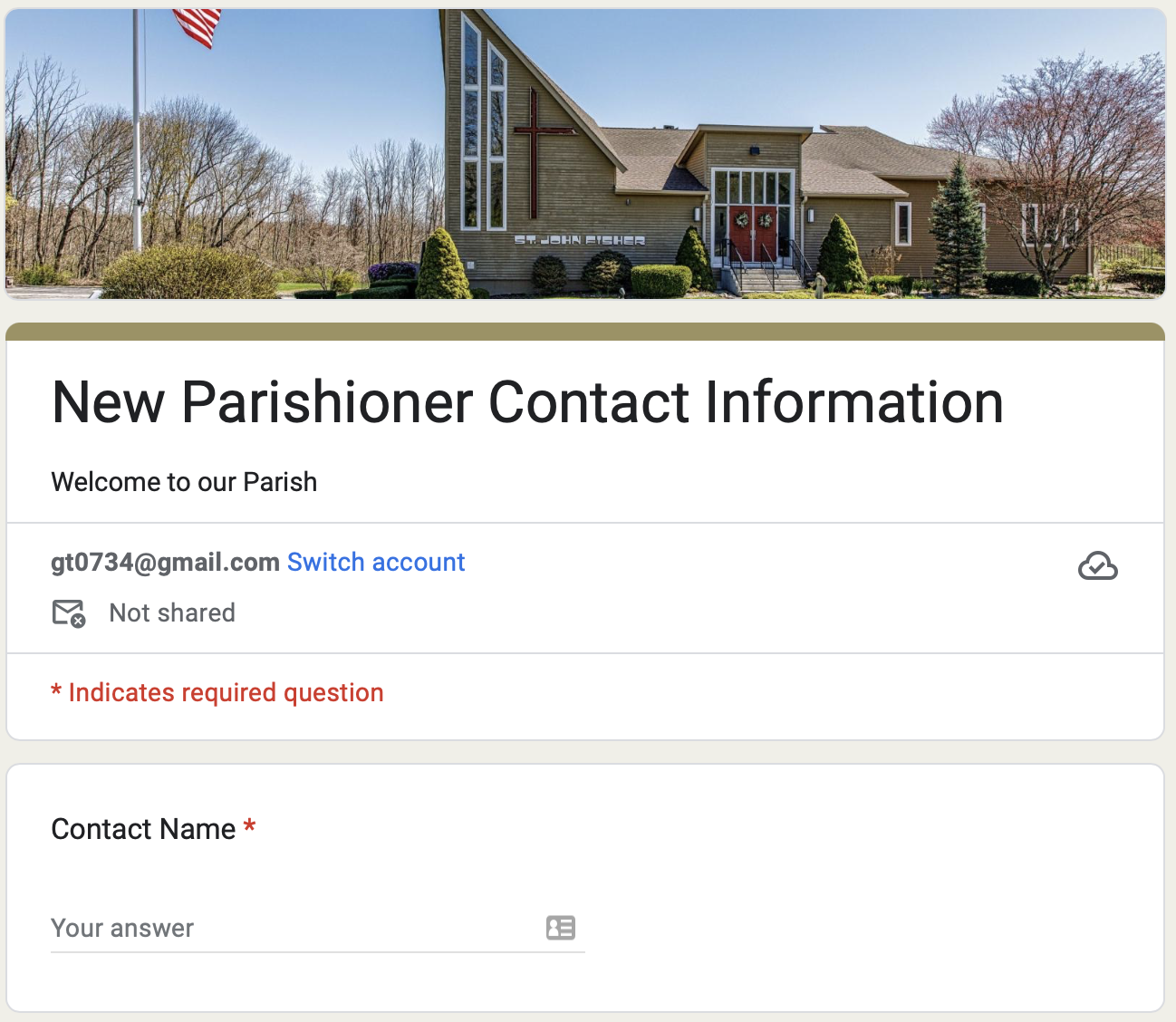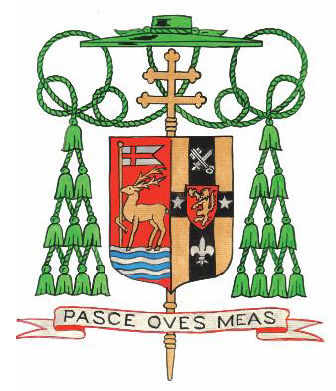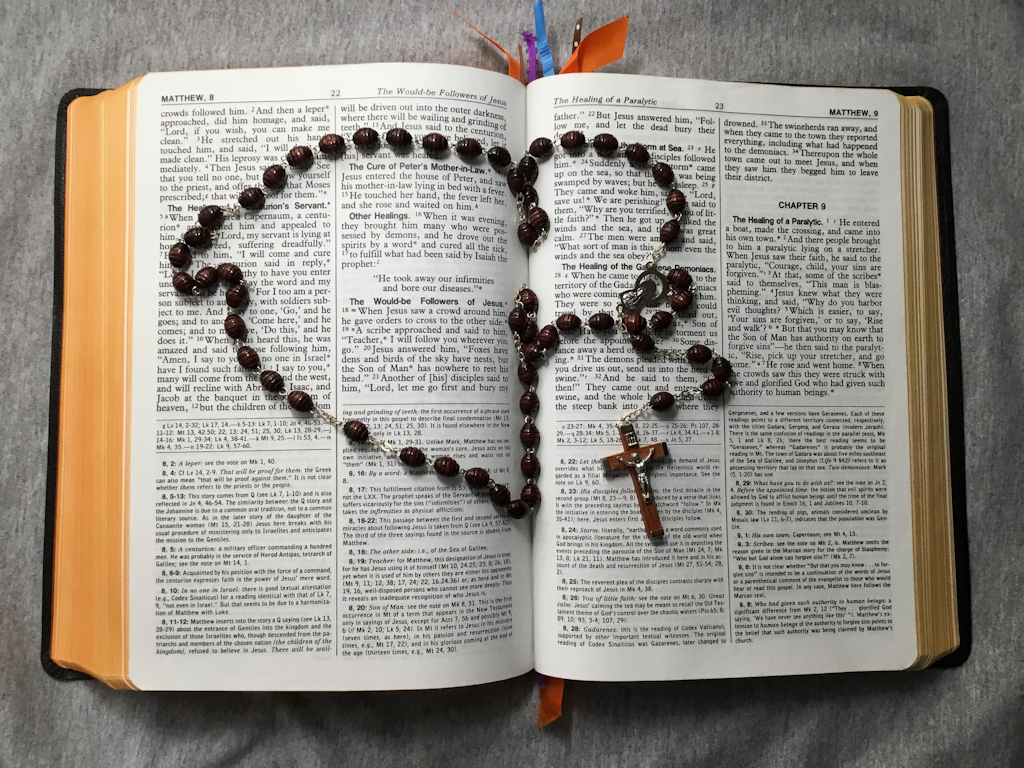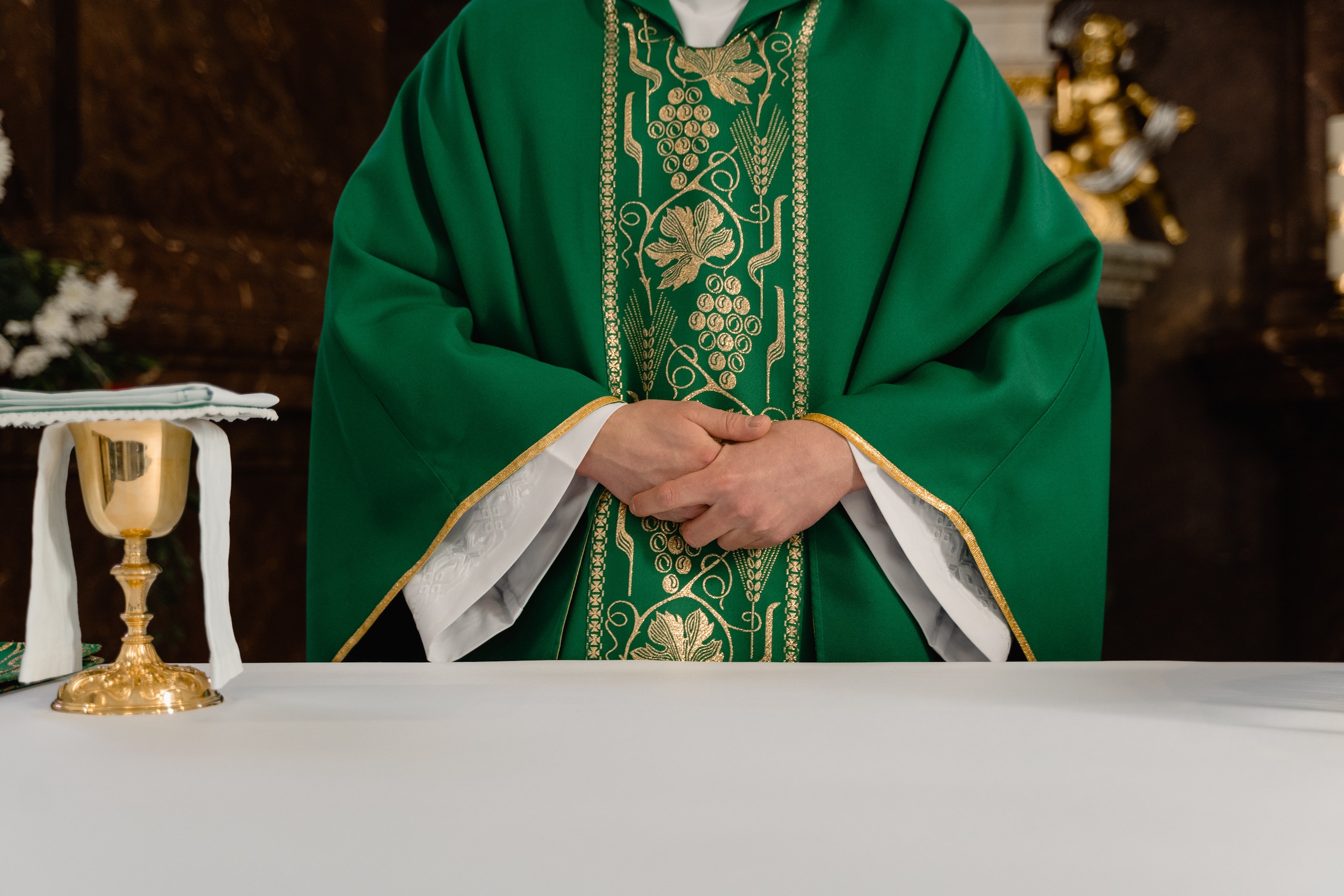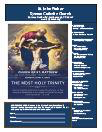Inquirers: Contact – James Castellani, RCIA & Adult Confirmation Coordinator This email address is being protected from spambots. You need JavaScript enabled to view it., 860-295-9904 or Contact – St. John Fisher Parish Office This email address is being protected from spambots. You need JavaScript enabled to view it., 860-295-0001
Introduction:
R.C.I.A. (The Rite of Christian Initiation for Adults) is the modern continuation of the very same process used during the time of the conversion of the early Christians. Those “electing” to follow the faith were adopted into the Christian community for a period of instruction and observation. At a time when individuals were deemed “ready” they were brought into full communion with the Christian community of the time.
The modern, parish-based RCIA process was reinitiated in the Church in 1972 with the conclusion of Vatican II. There are various study guides which are used by the various parishes, but the main themes of RCIA are consistent in all parishes; the RCIA process it is a period of reflection, prayer, instruction, discernment, and formation. There is no set timetable and those who join the process are encouraged to go at their own pace, taking as much time as they need. Although the average process generally takes between eight to twelve months, it can take up-to two or more years for some individuals. Those who enter the process are expected to begin attending Holy Mass on a Sunday, and typically attend a weekly RCIA session, and to become increasingly involved in the activities of their local parish.
The RCIA process is overseen throughout every phase by the local parish pastor, clergy and/or religious. However, the week-to-week administration of the process, including its teaching element, is increasingly being undertaken by lay Catholic Catechists.
After each inquirer (catechumen and candidate) receives approval to enter the process from our parish’s pastor, the process “coordinator” develops a mutually agreeable schedule for regular discussion sessions to commence for the 4 phases of the RCIA process, described below. Sessions require some preparation and active participation, and it is strongly encouraged that the “sponsor” of each inquirer be present for all discussions and all celebratory religious rites.
At St. John Fisher Church the R.C.I.A. process is administered by a Catechist Coordinator and overseen by our pastor. Like all RCIA processes, there are 4 Phases. We use a process called “The Journey of Faith” published by Liguori Publications. Each Phase of “The Journey of Faith” includes a series of pamphlets, each dedicated to a specific topic. There are 43 pamphlets in our process. Each pamphlet contains the foundation for group discussion sessions and is supplemented by readings from the Bible and the Catechism of the Catholic Church as well as handouts prepared by the various presenters.
The 4 Phases of RCIA – “The Journey of Faith”
* Phase I: The Period of Inquiry or Pre-Catechumenate (Aug thru Oct/Nov)
Concludes with: The Rite of Acceptance (Advent Sunday in November)
* Phase II: The Period of the Catechumenate (Oct/Nov thru 1st Sunday of Lent)
Concludes with: The Rite of Sending (at St. John Fisher - First Sunday of Lent), and The Rite of Election and Call to Continuing Conversion (at the Cathedral of St. Joseph, Hartford-same day)
* Phase III: The Period of Purification and Enlightenment (throughout Lent)
Includes: The Penitential Rite (at St JF - Candidates Only: Second Sunday of Lent) optional
The Scrutinies (Elect Only: Third, Fourth, and Fifth Sundays of Lent) optional
The Presentation of the Creed (Elect Only: Third Week of Lent) optional
The Presentation of the Lord’s Prayer (Elect Only: Fifth Week of Lent) optional
Concludes with: The Easter Vigil mass (blessing with the Sacraments of Initiation)
* Phase IV: The Period of Mystagogy or Mystagogia (Easter to Pentecost)
Terminology to understand:
“Sacraments of Initiation:” - The Sacraments of Baptism, Penance, Holy Eucharist, Confirmation.
“Catechumens” - Those seeking entry into the Catholic Church who have not been Baptized (or may have been baptized in another institution but whose baptismal blessing is not recognized as valid.) Catechumens seek all the Sacraments of Initiation. At the conclusion of Phase II of the RCIA process, “catechumens” confirm their intention and commitment by signing the “Book of the Elect” before the bishop during the Rite of Election and Rite of Continuing Conversion. . From that point forward they are referred to as “the Elect.” At the Easter Vigil Mass, “the Elect” will receive the Sacrament of Baptism, first, followed by the other Sacraments.
“Candidates” - Those seeking full communion with the Catholic Church who have already been Baptized in the Catholic Church (or in a Christian church whose baptismal blessing is deemed acceptable by the Catholic Church). Candidates seek Penance, Holy Eucharist and Confirmation. At the conclusion of Phase II of the RCIA process, “candidates” confirm their intention and commitment before the bishop during the Rite of Election and Rite of Continuing Conversion.
RCIA PROCESS OVERVIEW
The following is a brief overview of the RCIA process that will outline and explain each of the four major phases of RCIA, their purpose and goals, and also briefly explain the various rites that accompany each phase.
This will not only serve as a reference and guide for RCIA Directors, catechists and teams, but can also serve as a good introduction to the RCIA journey for those inquiring about the Catholic faith. It is very important that the inquirers understand that the RCIA process is a “journey of faith” in which Christ is inviting them to a deeper relationship with him, and thus is inviting them into a new way of life and looking at the world.
Therefore, it is also very important that a good catechesis on the RCIA process is given to them, not only at the beginning of the journey, but also throughout the experience, particularly at the major turning points. This overview is designed to help in this important process.
The process supportive materials are entitled “The Journey of Faith,” published by Liguori Publications. The topical outline of this series of 43 pamphlets follows closely the liturgical seasonal Readings and themes for the period of time the process normally covers, i.e., Aug through Easter Vigil.
Note: This overview is of a typical RCIA process that covers a period of about nine months. Some parishes may do a year-round RCIA that covers a much longer period of time. While the time-frame may differ parish to parish, the principles and goals of catechesis and the rites in each period remain the same and can be adapted to many different situations.
Phase I: The Period of Inquiry or Pre-Catechumenate Phase (begins typically in August – November, at the latest)
The Inquiry Period is a very important and crucial period in the RCIA process. First, it is very important because it is during the Inquiry Period that those who are coming to inquire about the Catholic Church receive their first real interaction with the Church, not only in what the Church teaches and believes, but who the members of the Church are and how they live out their Catholic faith. The Inquiry Period is a crucial time of evangelization – it is about sharing the good news and truth about the Catholic faith, not only in her teachings but how it is lived out. Thus, those involved in catechesis and on the RCIA team must be conscious of not only what is being taught, but how the truths of the Catholic faith are being lived out.
Therefore, the goal of the Inquiry Period is two-fold:
1) To be a welcoming presence to those who are coming to explore the Catholic faith, and
2) to give a solid, but introductory, catechesis that effectively answers their initial questions, curiosities, and concerns about the Catholic faith and begins to open their hearts and minds to its fullness and truth.
The inquirers should be invited to ask questions and to engage in “faith seeking understanding” and catechists should be ready and willing to give answers to their questions that are satisfying and intriguing.
In most parishes, the Inquiry Period lasts from about min-August to mid-November, but many parishes conduct year-round Inquiry to welcome those interested in becoming Catholic at any time during the year. Regardless of the timeframe, the Inquiry Period serves as an introduction to the teachings and life of the Catholic Church.
It is advisable that a brief discernment tool be used towards the end of the Inquiry Period primarily in service to the inquirer more than to determine readiness to continue into the Catechumenate. A brief meeting with the Director or a team member serves to provide an opportunity for the inquirer to address any questions or concerns and to reflect on the journey past and also on what is ahead. The Inquiry Period can also end with an optional retreat experience or day of reflection.
* The Rite of Acceptance (A Sunday in October)
The Inquiry Period ends with the Rite of Acceptance. This also serves as the beginning of the Period of the Catechumenate. It is during this rite that the Inquirers become Catechumens (from the Latin meaning “those being instructed”, the Catechumens are those not baptized) or Candidates (those already baptized but seeking full communion with the Church).
This rite has two parts. During the first part of the Rite of Acceptance, the pastor and the parish community officially welcome the Catechumens and Candidates and recognize their desire to possibly join the Catholic Church. The parish community, and in particular the Godparent or sponsor, promises by their prayers and example to support the Catechumen or Candidate during their RCIA journey. In many ways the Catechumens and Candidates are being introduced to and welcomed by their new parish family.
In the second part of the Rite of Acceptance, Catechumens and Candidates are called to accept the cross of Christ and to follow in the footsteps and example of Christ through lives resplendent in faith, hope, and love. During this moving rite, the Godparents and sponsors trace the cross on various parts of the body of their Catechumen or Candidate as a sign that they are becoming instruments of Christ’s love and truth and those who are not baptized are formally accepted into the order of Catechumens.
Phase II: The Period of the Catechumenate (November to the Start of Lent)
The Right of Acceptance begins the Period of the Catechumenate. This period is the longest period of the RCIA process and is the period that involves the formal teaching and training in the Catholic faith. It is during this period that the Catechumens and Candidates receive a systematic presentation of the Catholic faith: what the Church believes (Creed), how we worship (Sacraments), how we live as followers of Jesus Christ (Morality), and how we pray (Prayer). Catechesis during this period must focus on the Father’s marvelous and merciful plan of salvation history, beginning with Creation, the Fall of Adam and Eve and the inauguration of the Father’s plan of salvation, the covenants of the Old Testament, the Incarnation of Christ, the death, Resurrection, and Ascension of Christ, and the birth and mission of the Catholic Church.
During the Period of the Catechumenate, the Catechumens and Candidates become apprentices of the Catholic faith, that is, they not only come to know and understand what the Church teaches and believes, but they also through the examples of their sponsors, catechists, and parish community learn how to live the Catholic faith. Thus, their proper formation is first and foremost the responsibility of the catechists and sponsors, but is ultimately the responsibility of the entire parish community.
It is also during the Period of the Catechumenate that the Catechumens and the Candidates begin to attend Mass together for the Liturgy of the Word and after the homily are then dismissed to study and reflect upon the Scriptures in a session called Celebration of the Word of God. This allows them to grow in their liturgical experience and to also come to a greater appreciation and understanding of Sacred Scripture within the life and mission of the Church and her worship. Celebration of the Word of God sessions occur every Sunday until Easter.
It is very appropriate to have a period of discernment and a discernment meeting with each of the Catechumens and Candidates towards the end of the Catechumenate. The purpose of this discernment time and meeting is to measure the spiritual and moral progress of each participant and to measure their readiness and desire to begin the final period of preparation for the Easter sacraments during the season of Lent. This discernment should allow the Catechumens and Candidates to look into their own hearts to discern their readiness and desire to enter the Church. While this readiness does not yet have to be complete, there should be sufficient progress in understanding and living out faithfully and fully the teachings of the church. This is the proper time and setting to prayerfully and pastorally flush out any issues, concerns, or questions that might be impediments to full communion with the Catholic Church.
The Rite of Sending (First Saturday of Lent)
The Period of the Catechumenate ends first with the celebration of the Rite of Sending. During this rite, the pastor and parish community recognize the Catechumens and Candidates for their spiritual and moral progress during the Catechumenate. The pastor and community then send them forth to meet the diocesan bishop for the Rite of Election and Call to Continuing conversion that is usually celebrated later that day or sometime the following week.
The Rite of Election and Call to Continuing Conversion (First Sunday of Lent)
The Rite of Election and Call to Continuing Conversion is celebrated by the diocesan archbishop (or bishop) and concludes the Period of the Catechumenate and inaugurates the Period of Purification and Enlightenment. During this rite, the Catechumens and then the Candidates are recognized by the bishop for their spiritual and moral progress during the Catechumenate. The Catechumens names are then offered for enrollment in the “Book of the Elect,” symbolizing the names enrolled in the Book of Life in the Book of Revelation. The bishop then accepts the Catechumens request for Baptism at Easter and they then become known as “the Elect.” The bishop then welcomes the request of the Candidates to receive Confirmation and Eucharist at the Easter Vigil. The bishop also individually welcomes the Elect and Candidates during the rite.
Phase III: The Period of Purification and Enlightenment (Lent)
The Period of Purification and Enlightenment coincides with the season of Lent, and calls the Elect and Candidates to a time of deeper conversion and penance, and asks them to invite Christ ever more deeply into their hearts and minds as they prepare for the Easter sacraments. Catechesis during this period should emphasize prayer and conversion, as well as the moral teachings of the Church. A suitable catechesis on the Sacrament of Penance should precede the celebration of the sacrament by the Candidates which should also take place during this period.
It is also appropriate for there to be some type of Lenten retreat experience for the Elect and Candidates during the Catechumenate. This can be an actual weekend retreat or even a one day retreat. The retreat should focus on the Lenten themes of conversion, penance, and prayer especially in light of preparation for the Easter sacraments. One effective and powerful retreat experience is one that is built around the readings at the Easter Vigil. This is not only proximate preparation for the Vigil Mass, but also gives the participants the opportunity to reflect upon the Father’s loving plan of salvation accomplished in Jesus Christ, but then also to reflect upon Christ’s plan of salvation in their own personal lives.
Finally, there are several rites that take place during the Period of Purification and Enlightenment focusing on conversion and repentance for sin. All of the rites serve as an immediate preparation of the Elect and Candidates for the celebration of the Easter sacraments at the Easter Vigil. These rites are as follows:
* The Penitential Rite (Candidates Only: Second Sunday of Lent) - optional
This short rite, for the Candidates only, is celebrated on the second Sunday of Lent. It calls them to a deeper conversion away from sin and towards Christ and calls down the Holy Spirit to strengthen them during the season of Lent. The Candidates are called forward with their sponsors and are asked to kneel in front of the altar. Intercessions are then prayed for the Candidates and then an exorcism (prayer of deliverance from sin and evil) is prayed over them calling down the power of the Holy Spirit and exhorting them to continue to walk in the light of Christ and to avoid the darkness of sin and evil. The Candidates are then dismissed with the Elect for the Celebration of the Word of God.
* The Scrutinies (The “Elect” Only: Third, Fourth, and Fifth Sundays of Lent)
The Scrutinies are short liturgical rites for the Elect during the season of Lent that invokes the grace and power of the Holy Spirit and calls the Elect out of the darkness of evil and sin and into the light of Christ.
The purpose of the Scrutinies is to call upon the intercession of the parish community for the Elect and to help them with the grace of the Holy Spirit to persevere in their Lenten penitence and their ongoing conversion to Christ in preparation for Baptism and the Easter sacraments. During each Scrutiny, the Elect are called forward with their Godparent and are asked to kneel in prayer in front of the altar with the Godparent placing their hand on the shoulder of the Elect. After a brief opening prayer, the intercessions for the Elect are followed by a short exorcism and the calling down of the Holy Spirit. The Elect are then dismissed for the Celebration of the Word of God.
Each of the Scrutinies are based upon a Gospel reading from the Gospel of John that has to do with the theme of conversion and coming into the light of Christ. Although this Gospel reading will be proclaimed at Mass, it is very important that the elect have had the opportunity to read and prayerfully reflect upon the reading before each of the Scrutinies so that they can better understand and participate in the rite. It is a good idea to take some time out of class before each Scrutiny to proclaim the Gospel reading and give some introductory catechesis on each reading. Then ask the Elect to spend some time in prayerful reflection before the Scrutiny on Sunday. The readings can then be more fully reflected upon and discussed in the Celebration of the Word of God. The readings for each Scrutiny are as follows:
* First Scrutiny: The Samaritan Woman at the Well: John 4:4-42
* Second Scrutiny: The Man Born Blind: John 9:1-40
* Third scrutiny: The Raising of Lazarus: John 11:1-44
Pastoral Note: These readings are normally proclaimed during the cycle A year of readings. Many parishes proclaim this Gospel on these Sundays even during cycle B and C for the purpose of the Scrutinies. However, sometimes pastors may elect to read the cycle B or C reading during that year. Regardless, it is important that one proceed as above, in that the RCIA participants receive the reading for the Scrutiny beforehand so that they are aware of and can more deeply participate in the richness and grace of the rite.
* The Presentation of the Creed (Elect Only: Third Week of Lent) - optional
This short rite takes place sometime during the third week of Lent. It can take place within a Mass or as a separate prayer service. During this rite, the Elect are presented with a copy of the Nicene Creed – the creed into which they will be baptized.
* The Presentation of the Lord’s Prayer (Elect Only: Fifth Week of Lent) - optional
This short rite takes place sometime during the fifth week of Lent. Like the Presentation of the Creed, it can take place within the context of a Mass or as a separate prayer service. During this rite, the Elect receive the Our Father, the prayer of Jesus himself, as an example of prayer and as a reminder to pray always.
The Easter Vigil
The Period of Purification and Enlightenment ends with the celebration of the Easter Triduum which has its climax in the celebration of the Easter Vigil Mass. Here the Elect and the Candidates receive the Easter sacraments and are fully initiated into the Catholic Church. However, the RCIA process is not over yet!
Fourth Period: The Period of Mystagogy or Mystagogia (Easter to Pentecost)
The fourth and final phase/period of RCIA is the Period of Mystagogy or Mystagogia. Mystagogy means “a deeper pondering of the mysteries.” During this period, the neophytes (newly baptized) and those who received full communion with the Church continue their catechesis as new members of the Church by coming to a new and deeper understanding of their identity as Catholics, the sacraments, the moral life, and prayer. Catechesis during this period should have as its goal the relevance of the Paschal mystery of Christ in their lives and to strengthen their identity and mission as lay members of the Church. Mystagogia should also provide opportunity for service and also an invitation and introduction to the various ministries and opportunities to serve and become involved in the parish community. In most dioceses, the bishop has a gathering of all the new Catholics in which he officially welcomes them and celebrates Mass with them.
Attendance can often be a difficulty during Mystagogia. Therefore, the importance of the Period of Mystagogy should be taught and reinforced throughout the RCIA process so that the Catechumens and Candidates know that the process is not complete at Easter Vigil and that the Period of Mystagogy will help them grow in their new identity as Catholics. Also, catechesis must all the more be relevant and dynamic in the Mystagogia, especially in helping them to more deeply appreciate their new-found faith and to assist them in assimilating fully into the parish community.
The Church asks that in addition to the Period of Mystagogy, there be a “neophyte year” in which those who are newly Catholic are invited to continue to meet and study the Word of God and the teachings of the Church to grow in their new identity and to allow the roots of their newly sown faith to emerge and grow strong. This calls directors, catechists, and RCIA teams to find ways in which to enrich the faith of the “neophytes” for the first year. It can be a pastoral challenge, but it is very crucial and necessary. There are many options such as weekly Bible study, continuing catechetical classes, or small Christian communities.
The RCIA process is much more than a series of classes one must take before joining the Catholic Church. It is a rich and grace-filled journey of faith in which one encounters and walks with Jesus and learns how to follow him in a new and deeper faith. The RCIA journey can be set in the context of the Gospel story of the Road to Emmaus which provides for us a powerful image of the RCIA journey of faith and gives us rich insight on how to provide dynamic and powerful catechesis throughout the RCIA process.
Note: Attached is the listing of the various pamphlet titles in the “Journey Of Faith” RCIA process. Discussion groups may be led by various parish clergy or parishioners, as the subject matter and scheduling allow.
R.C.I.A. – St. John Fisher Church – Marlborough, CT
“Journey Of Faith” by Liguori Publications - Process Overview
Phase I - (PRE-CATECHUMENATE) - Period Of Inquiry - “Journey Of Faith” Series
Q1 - “Your Journey of Faith”
Q2 – “What Do Catholics Believe?”
Q3 – “What Is the Meaning of the Mass?”
Q4 - “The Bible”
Q5 – “How Do Catholics Interpret the Bible?”
Q6 – “The Saints”
Q7 – “Mary”
Q8 – “Places in the Catholic Church”
Q9 – “Who’s Who in the Catholic Church”
Q10 – “Catholics and Prayer”
Q11 – “Catholic Practices”
Q12 – “Catholics and Church
Rite of Acceptance (Advent Sunday mass) – St. John Fisher Church – Rev. Alvin Leblanc, presiding, with Dcn John McKaig & parishioners.
Phase II - (PERIOD OF CATECHUMENATE ) - Scripture and Teaching - “Journey Of Faith” Series
C1 – “The Sacraments”
C2 – “The Sacrament of Baptism”
C3 – “The Sacrament of Confirmation”
C4 – “The Sacrament of the Eucharist”
C5 - “The Sacrament of Penance / Reconciliation”
C6 - “The Sacrament of Anointing the Sick”
C7 – “The Sacrament of Marriage”
C8 – “The Sacrament of Holy Orders”
C9 – “The People of God”
C10 – “Who Is Jesus Christ?”
C11 – “The Early Church”
C12 – “History of the Church”
C13 – “Christian Moral Living”
C14– “Social Justice”
C15 – “The Consistent Life Ethic”
C16 – “The Dignity of Life”
Rite of Sending (1st Sat or Sun of Lent; 4:00 PM/8:30 AM or 10:30AM mass) – St. John Fisher Church –
Rev. Alvin Leblanc, presiding, with Dcn John McKaig & parishioners.
Rite of Election (1st Sun of Lent: 3:00 PM service) – Cathedral of St. Joseph, Hartford, CT – Archbishop Leonard Blair, presiding, with all RCIA catechumens and candidates from throughout the Archdiocese of Hartford.
Phase III – (PERIOD OF PURIFICATION AND ENLIGHTENMENT) – “Journey Of Faith” Series
L1 – “What Is Lent?”
L2 – “Saying Yes to Jesus”
L3 – “Take A Look”
L4 – “Nicene Creed”
L5 – “The Way of the Cross”
L6 – “The Lord’s Prayer”
L7 – “The Meaning of Holy Week
Sacrament of Penance (by arrangement with Rev. Alvin Leblanc)
Sacraments of Initiation (8:00 PM mass – Easter Vigil) – Rev. Alvin Leblanc, presiding, with Deacon John McKaig & parish.
Phase IV – (MYSTAGOGY) - Scripture and Teaching – “Journey Of Faith” Series
M1 – “Conversion: A Lifelong Process”
M2 – “The Laity: Called to Build God’s Kingdom”
M3 – “Your Special Gifts”
M4 – “Family Life”
M5 – “Your Prayer Life”
M6 – “Discernment”
M7 – “Holiness”
M8 – “Evangelization”
2023 0427 An Overview of the RCIA Process
 Gather the People | Missalette P. 305
Gather the People | Missalette P. 305 Remain vigilant and on your guard! There are still messages and texts seeming to come from Father Al asking you to respond to him. DO NOT respond directly. Contact the Parish Office at (860) 295-0001 or to a known contact number and not through "REPLY" unless you know for sure that the person you are conversing with is Father LeBlanc. You will not be asked to send money, gift cards or be asked for any exchange of goods of any value via text or email. DO NOT give any personal or financial information.
Remain vigilant and on your guard! There are still messages and texts seeming to come from Father Al asking you to respond to him. DO NOT respond directly. Contact the Parish Office at (860) 295-0001 or to a known contact number and not through "REPLY" unless you know for sure that the person you are conversing with is Father LeBlanc. You will not be asked to send money, gift cards or be asked for any exchange of goods of any value via text or email. DO NOT give any personal or financial information.